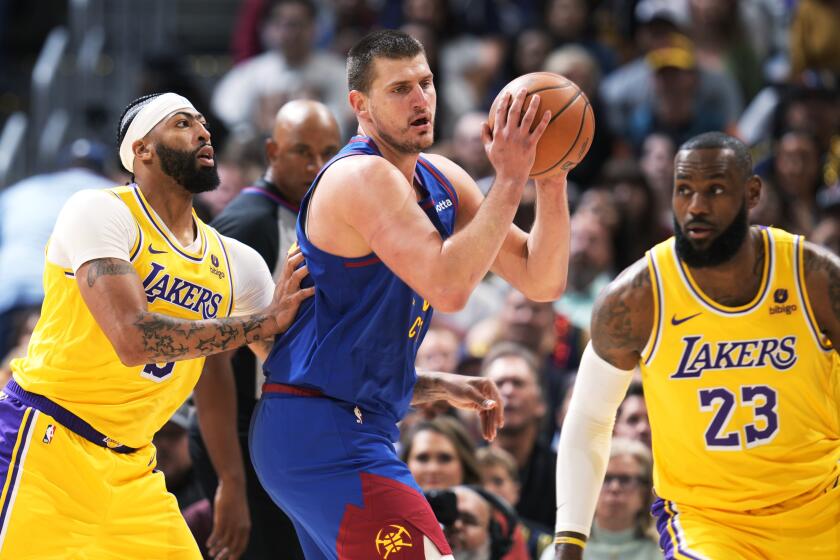Rough Questions Preferred : PGA: Golfers would rather talk about anything except racial controversy as major tournament begins at Shoal Creek.
Nick Faldo could win his third major golf tournament of the year, Greg Norman could win his second ever. Jack Nicklaus could win on a course he designed, Payne Stewart could defend a title. Tom Kite could add to his record $6 million in career earnings, Hale Irwin could continue his middle-age renaissance.
And no one will remember. At least, not at first they won’t.
Much against its will, the 1990 PGA Championship at Shoal Creek has become a poster child for social reform. Its legacy is course founder Hall Thompson and his June 20 declaration in the Birmingham Post-Herald that the club wouldn’t be pressured into accepting blacks. Its sporting significance is forever overshadowed by controversy.
Thompson’s comments provoked outrage, disbelief and threats of protest. The PGA Championship, one of golf’s four majors, found itself in turmoil and with little alternative except to confront the issue. PGA of America officials considered a change of venue--both Memphis and Nicklaus’ Muirfield Village in Ohio were contacted--before a negotiated settlement was reached last week.
The planned protests were averted when Shoal Creek extended an honorary membership to a black Birmingham insurance executive and promised to process the application of another local black citizen. But the PGA Championship, which begins today, has never been the same--no matter how hard the PGA, tournament organizers and comment-shy PGA Tour players try.
Wednesday’s pre-tournament schedule included the annual State of the PGA of America news conference, usually a sparsely attended, dry affair that often packs the excitement of a convenience store opening. This time, the room was packed as PGA Chief Executive Officer Jim Awtrey and PGA President Pat Rielly introduced new selection guidelines for future PGA Championship sites beginning in 1995.
As expected, the PGA added to its existing criteria the stipulation that prospective clubs must demonstrate that their membership policies are non-discriminatory. Without such guarantees, a private club won’t be eligible for consideration.
“Those courses selected in 1995 will have minorities, including women and blacks as members,” Awtrey said.
Awtrey also accepted partial blame for the Shoal Creek controversy. When asked if the PGA would have altered its selection process had Thompson never granted his infamous interview with the Post-Herald, Awtrey said, “Well, certainly we may have been remiss in not addressing this in the past.”
Still to be determined is the status of those clubs already chosen as host sites for the PGA Championships in 1991 through ’94. Awtrey would say only that the PGA is having “serious discussions” with those clubs, presumably to ensure that such criteria are met.
“We’ve made it clear what our intentions are,” he said.
So have the players, many of whom are reluctant to discuss the developments of the past few weeks. Ask them about the high, thick Bermuda grass that swallows errant drives at Shoal Creek, and the reactions are spirited and endless. Ask them about the ramifications of Thompson’s comments, and the answers generally become guarded and brief.
“I have no comment, next question,” said Irwin, who won the U.S. Open and the Buick Open earlier this year.
“I play golf, I don’t make policy,” said Stewart, the defending PGA champion. “We play golf for a living. Discrimination is all over the world. It didn’t start here at Shoal Creek. The players have probably made more jokes than anything else.”
Norman, 0-for-majors in 1990, said he didn’t want to “stir it up” with any comments, though he did allow that the attention was justified and the changes welcome.
And this from Nicklaus, who is playing in his 29th PGA Championship: “Old news as far as I’m concerned. We have talked enough about it.”
Instead, they would rather concentrate on familiar topics, such as the length of the rough--3 1/2 inches, still growing; and the greens--hard, swift; and the favorite--Faldo, winner of the Masters and the British Open this year.
Stewart was the most critical of the course’s setup. He found fault with nearly everything, including the PGA of America’s decision to let the rough grow long, as well as the firmness of the putting surface.
“If you can’t play in the fairway, you can’t play this golf course,” he said. “A lot of guys will be hitting one-irons off the tee. There are a lot of holes where you will be hitting irons. That’s not the way golf was meant to be played.”
Nicklaus, who designed the course, said he recommended that the fairways be cut wider for the tournament. The PGA chose otherwise.
“I’d like to see the options in the play of golf,” he said. “They felt like it would be more difficult.”
The complaints rang somewhat hollow considering the recent turn of events. By all accounts, history was made here last week and it had nothing to do with Bermuda rough or thin fairways.
PGA Notes
Jim Awtrey, PGA of America CEO, said that Kiawah (S.C.) Island, site of next year’s Ryder Cup matches, already adheres to the new club selection standards. . . . Pat Rielly, PGA president and head professional at Pasadena’s all-white Annandale Golf Club, said there is nothing he can do about the club’s membership makeup. “The policy is set by Annandale,” he said. “I don’t feel awkward about it.”
Tom Watson was named PGA of America player of the decade. Watson won three British Opens and one U.S. Open during the 1980s, as well as player-of-the-year honors twice. “I receive it with mixed feelings,” he said. “The first part of the decade seemed like I built up a 10-shot lead. Then in the second half, I held on to win it.” Watson last won a PGA Tour event in 1987--the Nabisco; and a major in 1983--the British Open. He has never won the PGA.
If Payne Stewart repeats as PGA champion, it will mark the first time since stroke play was initiated in 1958 that a player has won the title two years in a row. . . . Jodie Mudd, Wayne Levi and Tony Sills withdrew from the tournament. Mudd was replaced by Jay Don Blake, Levi by Bill Sander and Sills by Ray Stewart.
PGA WINNERS SINCE 1979 1989 Payne Stewart 1988 Jeff Sluman 1987 Larry Nelson 1986 Bob Tway 1985 Hubert Green 1984 Lee Trevino 1983 Hal Sutton 1982 Raymond Floyd 1981 Larry Nelson 1980 Jack Nicklaus 1979 David Graham AP/Los Angeles Times
More to Read
Get our high school sports newsletter
Prep Rally is devoted to the SoCal high school sports experience, bringing you scores, stories and a behind-the-scenes look at what makes prep sports so popular.
You may occasionally receive promotional content from the Los Angeles Times.






